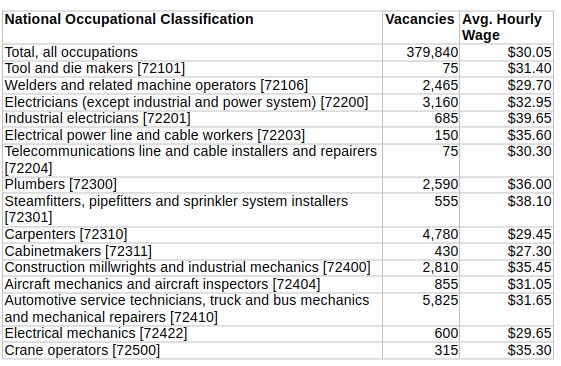Are Careers in the Trades the Solution to All Our Troubles?
When it comes to acquiring the skills you’ll need for a profitable and satisfying career, university is far from your only choice. Sure, even I might be reluctant to go under the knife of a self-taught brain surgeon or drive over a bridge designed by a guy who watched a few YouTube videos on engineering. But I’m all-in on the value of non-graduates for most other services.
While working for a particular Ottawa-based software company years ago, I asked the lead developer whether he’d hire a programmer with just a high school diploma and a good project portfolio. “Who needs a high school diploma?” he immediately replied. And: “After hiring university graduates, I have to waste the first six months getting them to unlearn all the terrible coding habits they picked up in school.”
With that personal bias as context, I’m an enthusiastic supporter of careers in the trades. But it’s still worth taking a dive into the numbers to understand exactly what the trades job market looks like, how easy it would be for you (or your grandkids) to find success, whether the government could do anything to make itself useful, and what’s really stopping young Canadians from choosing the trades.
How many unfilled jobs are there across all fields right now? The average number through the 12 months following January, 2024 is 559,715. Over that same period, the average number of unemployed people was 1,431,008. That’s around 2.6 job seekers for every vacancy. Specific to the construction sector, as of January 2025, there’s a 3.3 percent vacancy rate that corresponds to 40,800 available jobs.
Registrations for Red Seal Program apprenticeships have been growing. Back in 1991, there were only 193,000 or so signed up. That number represented around 1.51 percent of the total workforce at the time. By 2023, registrations had climbed to around 460,000, or 2.27 percent of the workforce. The Red Seal program - whose origins stretch all the way back to the early 1950’s - obviously continues to serve a useful function.
Unemployment levels in the trades are significantly lower than among the general population. In 2024, unemployment for Canadian workers in all industries was 6.3 percent. The rate for people in construction trades was 5.6 percent, and people working in the utilities sector (those operating electric, gas, and water utilities) experienced just 1.4 percent unemployment.
Average wages for trades have been keeping up with inflation over the years. Back in 2001, the average hourly wage for trades, transport and equipment operators and related occupations (except management) was $17.47. The value of that hour’s pay in 2025 dollars would be $29.42. But, as of March 2025, the actual hourly wage for comparable work is $33.28. Another win.
Data from the 2020 census shows annual earnings for workers in the utilities and construction trades compared with overall income averages. As you can see from the table below, non-management workers of all ages in the electrical power and natural gas field actually earned more than double the national average, and all utility workers enjoyed considerable pay advantages. Besides heavy and civil engineering construction, construction workers in general earned about the same as the national average.
Those numbers will obviously vary by geographic region and other factors. But all that’s encouraging. Some trades might offer only average wages, but none of them requires the heavy opportunity costs that come with a university education.
And some trades - especially utilities - can indeed provide a nice (pre-tax) living. Take elevator mechanics in Toronto who can apparently earn $91,701 a year - as apprentices! (Although I will warn you that that particular career has its ups and downs.)
Here’s a random selection of nation-wide position vacancies (from Q4 2024) for some specific trades:
The available numbers for some trades (like elevator mechanic) were considered “too unreliable to be published”. But there are many dozens of categories in that Statistics Canada dataset that are available (and you can filter by province). It’s a shame this particular resource isn’t better known.
That Red Seal Program is an under appreciated asset. Besides the apprenticeship opportunities, the Red Seal certification endorsements solve mobility and universality problems that still plague the U.S. generations later.
However, the program isn’t without challenges. Only around half of apprentices in the system complete their programs within six years, many drop out due to financial pressures, lengthy training periods (typically 2–5 years), or lack of employer support. Problems finding the employers willing to participate are especially stark in competitive or rural markets.
Having said all that, there does seem to be a disconnect between chronically high unemployment numbers and unfilled jobs in the trades. But I’m not sure there’s all that much governments can do about it. After all, we already have the Red Seal Program and layers of federal and provincial incentives and tax credits designed to attract more participants. What’s missing?
Perhaps the problem is cultural. Trades aren’t popular because they’re not popular. And the primary reason they’re not popular because many of the key cultural influences in the lives of young Canadians are public school administrators and teachers - whose own thinking was largely shaped through post-secondary education experiences.
Perhaps that’s where the change needs to start.





Trades indeed are under appreciated in some places. But…there are systemic reasons some trades are avoided. I work in forestry. The trade part of forestry, driving trucks, running a skidder, or working in a sawmill is just plain harder than the management side I went to university for. Living in a camp or working awful hours, in the mud or cold or dust is just not that appealing. And if anyone has ever slung drywall or installed roofing you will understand why those trades are typically for entry level people with few other options. Some trades avoid these pitfalls and are mentally challenging (electrician or…) with good working conditions. But some are just plain hard. With a worker shortage we will have to automate and improve efficiency for the least desirable trades. Witness how few workers exist in a modern sawmill, and the ones who are there are essentially computer operators, with very high skill and training requirements. And somewhere in the mill is an engineer who has to design and maintain all that automation.
Trade are also alot harder on the body. People don't want to do it. I don't blame them. Our standards here are outdated and companies don't want to spend money to help the employees with new equipment.